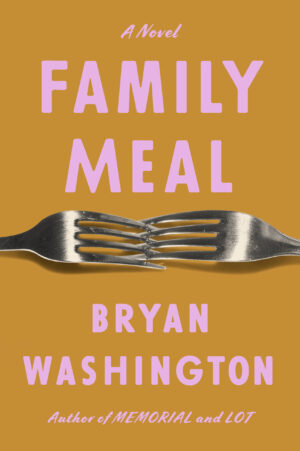Family Meal
by Bryan Washington
reviewed by Marisa Wright
Bryan Washington identifies as more of a reader than a writer. He’d always rather be reading, he says. What can get him to start writing is when he wants to read something that he doesn’t see out in the world.
Read his sophomore novel, and you’ll see what got him to sit down and write it. Exploring themes of grief, food, family, and sex, Family Meal is not like many other books out there. The novel is told from the perspective of three queer men in their twenties: Cam, Kai, and TJ. Unfolding in Houston, Los Angeles, and Osaka, the story begins with Cam, who leaves LA after the death of his boyfriend Kai and returns to his Houston roots after running into TJ, a childhood friend whose family took him in after his parents’ death and with whom he shares an intimate past. Cam’s descent into a sea of sex addiction, drugs, and disordered eating at first appears to be the central crisis of the story, but Washington seamlessly modulates to Kai and TJ’s voices, adding depth and new elements to the narrative.
Washington expands on themes and characters familiar from his first novel, Memorial, which followed his widely celebrated debut short story collection Lot. As in his other works, grief shows up throughout Family Meal, which depicts the universal human experience of loss and the intricate paths we travel toward healing.
Like his first two books, Family Meal predominantly features Black and East Asian queer characters. At times, Washington explores contemporary issues that may, at first glance, seem lifted straight from the headlines—among other things, the book touches on gentrification and police brutality. However, he incorporates them as both natural and instructive elements of his characters’ narratives—a reminder that the tragedies covered in breaking news reports are not mere abstractions, but have tangible impacts on individual lives.
Another continuity with Washington’s previous work is the central importance of food as cultural practice and as metaphor. Cam’s love for Kai becomes evident when he finally agrees to cook for him after a long period of reluctance (“He called me the first boyfriend he’d done this for”). When TJ receives an HIV-positive diagnosis, Cam flies home to Houston in lieu of attending his college graduation to stay with TJ for two weeks, caring for him primarily by cooking all his meals. After his grief spiral, Cam eventually returns to folding croissant dough and mixing eggs into flour for kouign-amann at the bakery TJ’s family runs out of their home, a site of connection and restoration later in the novel. During one of Kai’s contentious trips home to New Orleans, he protests at the preposterous amount of food being prepared, but his mother chides him, “Cooking is care. The act is the care.”
The meals depicted in the novel—and the sensory response they evoke—serve as an entry point for the reader; the universality of food as a human touchpoint for care and connection can resonate with nearly everyone. In the hands of a less capable writer, it would be easy for this trope to feel overwrought and kitschy. But in Washington’s hands, it’s nimbly applied to a diversity of experiences, cultures, and contexts, and it reads as a natural fit into the narrative arc of the novel.
In the story itself, food serves as a means of communication, a way for characters to express themselves without the burden of words. Washington’s ability to evoke the sensory experience of food against a backdrop of dialogue between characters who never quite say what they mean enriches the narrative, immersing the reader into his characters’ lives and creating a tangible connection between their internal struggles and how they collectively show up for one another.
Family Meal is a stirring testament to Bryan Washington’s distinctive style and worldview, which prioritizes the collective over the individual. His characters are rendered with depth and authenticity as they navigate the tumultuous journey of grief, self-discovery, and the search for belonging. Told through evocative prose and immersive narration, Family Meal shows the reader the meaning of family and the power of a shared meal.
Published on March 13, 2024

